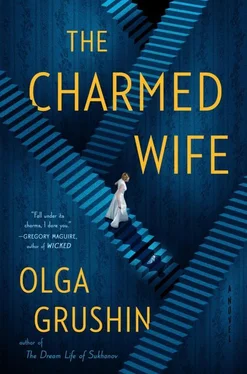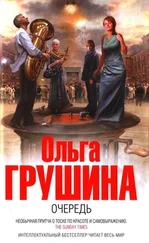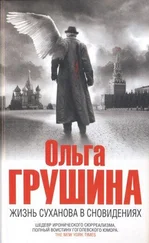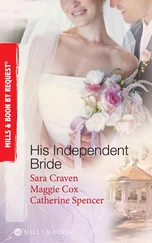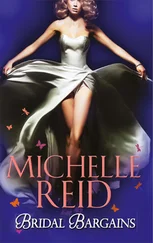“We argued all the time,” Nibbles interrupted. “I thought we should tell you, that you needed to know. Give the rogue the old heave-ho and good riddance, I said.”
“I disagreed.” Brie’s golden whiskers drooped. “Because who were we to destroy your happily ever after? You didn’t notice anything amiss, and you did seem happy. At first, anyway. Was I wrong? Please, dear princess, was I?”
Her chest filled with a fluttering, as of many birds she could not bear to release, not yet, not yet. She looked at the mice with unseeing eyes, and rose, and walked out of the room. As she slowly went through the palace, she had few coherent thoughts, concentrating merely on putting one foot in front of the other; but she knew, without thinking, that if she happened to interrupt her husband in the midst of yet another copulation, she would not be responsible for what occurred next. But when she threw open the door to the prince’s—now the king’s—study, she found him alone, sitting at his desk, his head buried in his hands, the painted prince, as before, gracing her with his radiant smile from the portrait above.
The prince—now the king—lifted his head at her entrance, and his eyes were lost, swimming. Then a look dawned on his face, a look she could not place, a look she did not want to decipher. She stood before his desk, straight-backed, still, in her regal ermine-trimmed robe the color of sorrow, her hands folded protectively across her chest as though shielding her heart from any further harm he might try to inflict upon it.
“Roland.” Her tone was flat. “Did you ever love me?”
And just like that, the odd look was gone from his face, and in the moment before it vanished, she knew it for a look of hope.
“ Now? You want to talk about this now ? My father has just died. Or have you been too preoccupied with your own precious little emotions to notice?”
She chose to disregard the ominous rising of his voice.
“I’ll take it as a no. You never loved me. And this portrait. Who painted it?”
“You’re unbelievable, you know that?”
He glared at her, and in his glare, she read a threat of looming violence.
She wrapped her arms tighter over her heart.
“Answer me. Who painted it?”
“Who painted it? I did!” he shouted. She forced herself not to shrink back. “I painted it! Imagine that, a prince of royal blood, able to do anything other than sign orders and chop off heads! Imagine me having ideas, having interests, having a life other than the life in which you have me pegged in your own pathetic little world of poodles and teatimes! But did you ever, even for just a second—” He made a visible effort, and his face, his voice, turned cold, turned dead; but his hands were clenched, his knuckles white, as if he was exerting an immense effort to contain something enormous, something monstrous, to prevent it from erupting and subsuming them both. “Did you know that I loved drawing as a child, that I wanted to be an artist, but they told me, when I was only six or seven years old, that I had to follow in my father’s footsteps, had to shoulder the burden of responsibility? No, you didn’t know, and why? Because you never asked . Never asked anything about me. So, let me tell you. I cried for a full week, longer than when my mother had left us, a small, lonely child with no one to talk to. And then I dried my tears and I grew up. I learned to do what was asked of me. Learned to rule my kingdom. Learned when harshness was needed and when to be lenient. Kept my hobbies in check. Married when it was required of me. Produced heirs when it was required of me. You’re right, I never loved you—and why would I? I thought, in the beginning, that you had spirit, that you had understanding, that you could be a worthy partner to me, and that, with time, something real might grow between us. Then I saw what you were really like, what you were really after. All you wanted were balls and roses. Being a sweet little princess . You knew nothing about hard work. You knew nothing about companionship. I should have never chosen you. I should have chosen someone with substance, not someone as vain, empty-headed, and unforgiving as you.”
Every word was a slap.
She felt the blood mounting higher and higher in her cheeks.
“But none of this is true!” she cried at last, hardly knowing what she was doing as she took a step, leaned on his desk, thrust her flaming face forward. “I wasn’t like that at all! I was young, and I was in love, and I tried to make you happy, I tried so hard, I did my best, I wanted to be a good wife to you, it was you—you—you who…”
“Who what ?”
“Who fucked anything that moved, that’s what, from the day we got married!”
He appeared momentarily stunned, his mouth flapping loose. Then he was shouting again, their faces so close now she could feel his spittle on her skin.
“Oh yeah? And what would you have me do? And why would you even care? From the day we got married, you made it painfully clear that you wanted nothing to do with me, that I repulsed you! You felt no passion for me, it was like I married a paper doll. Have you ever, ever in your life, enjoyed a single kiss? I was twenty-four—and my beautiful young wife was so frigid she couldn’t even be bothered to part her lips for me, much less her thighs!”
She recoiled, pressed her hand to her mouth, her lips suddenly, treacherously, burning with an unbidden memory of another man’s fiery kiss. A shocked silence rolled over the room, tolling with vast, terrible things that could not be unsaid. Across the ringing stillness, they measured each other, two people wearing the black of mourning, two people who had just lost someone they loved. She knew that, in that moment, he hated her every bit as much as she hated him.
He pushed his chair back, away from her, spoke through his teeth, in control once again. “But here we are, and this is how it is, how it will be, from now till the end, and I will have my little diversions to which you will kindly close your eyes, and you will have your porcelain knickknacks, or whatever else catches your feebleminded fancy, and I will pay for it. I will tolerate this intolerable situation because I need to protect the public face of my company and because you happen to be the mother of my children. I just hope to God they will grow up to be like me, not like you. Now get out . I am mourning my father.”
The last thing she saw, before turning and leaving the study, was the brilliantly painted man smiling his beautiful, loving, mocking smile into her eyes.
That night, she did not sleep. Transparent Brie and Nibbles hovered above the mantelpiece, trading anxious whispers, but she ignored them. After torching the nettle shirt in the fireplace and stomping the two pearl buttons into dust with her heel, she lay in her starched white bed, staring at the cupid-infested ceiling, her thoughts a feverish jumble of disjointed, whirling images, fears, losses all running together—her children growing up with that man for a father, the beekeeper’s kiss, the kind old king’s death, the deceitful portrait, the magic mirror, the green-eyed duchess, the duchess’s hapless cuckold of a husband and his sorry end… It would have been better had you, too, fallen off your horse long ago, it flashed into her mind out of nowhere—but immediately, horrified by her own savagery, she disowned the unworthy thought. Yet once unleashed, it would creep back again and again, as she lay tormented, night after night after night, for weeks on end. For time passed, of course, as was its wont. Her husband was crowned king, and she became queen; they saw each other at official functions, but avoided each other’s eyes and exchanged not a word. Her heart broke every time she looked at her son, at her daughter. At night, she would go back to her room, to her bed, and lie there, not heeding the timid consolations of the mice, glaring at the cupids on the ceiling, the same thoughts churning round and round in her head: Oh, if only he had fallen off his horse early on in their marriage—after she’d become heavy with Ro, but before she had time to look into that poisonous mirror and learn the truth about the conception. She was still blind to the man’s true nature then, small lapses in their life had not yet joined together into one impassable gulf, and she would have been able to smooth over the more inconvenient incidents in her mind, would have been able to cherish the memory of their love for each other. And instead of wanting to scream “Your father is a monster, a monster!” into her children’s sweet, innocent faces, she would be telling her daughter how proud he’d been of her and asking her son to find the bright star that his father had become in the skies, then crying herself to sleep every night with soft, affectionate tears. Her life would be sad yet full of warmth, solid at its heart, good . Now it felt hot, not warm, but the heat was hollow, hollow and angry, and she was forever seized with fear for Angie and Ro.
Читать дальше
